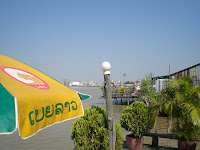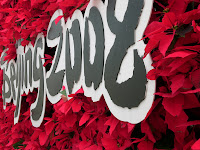Mid-life crisis? What crisis?
Perhaps 'crisis' is too strong a word but it's certainly a shock to the system. Apart from the tear-inducing pain on the first couple of days of the attack it seems that nothing in my lifestyle will ever be the same again. No beer for a start. No more shrimps or seafood. No liver, kidneys or other sweetmeats. No duck or venison. No mushrooms for goodness sake! Marmite! Even beef, pork, lamb and chicken are on the watch list along with things like peanuts, milk, cheese and peas.
What's left to eat? Bread and vegetables basically. Mmm. To be honest I've always been a little sniffy about vegetarians; I thought they were just a bit pigheaded to stubbornly eschew all the lovely meaty things I've always taken for granted. And now I know I was right. Blimey, it's boring eating veg all the time. And in Chengdu it's virtually impossible. Even if you order the Vegetable Soup (featuring "three fresh seasonal vegetables") they'll still hoy in a handful of sheep intestine or stomach just to add to the flavour. It's like offal doesn't count as meat here. Typical too, when I ordered it one of the three veg was mushrooms so I had to leave them behind too.
The diet was given to me by a Chinese doctor, a specialist in arthritis. She's really great but I think Chinese doctors take a certain delight in draconianism. Whatever the condition you have the first thing they'll say is "Stop drinking!". My regular doctor is a Korean guy who's worked in America and he is a lot more forgiving. "How can you live without fish?" he says, "No milk? But your body needs milk!". I like him. I'm expecting him to prescribe me double whiskys and a Havana cigar before I go to bed every night next. Other aspects of his bedside manner I'm less fond of. Of all the bits of dietary and medicinal advice he has given me he continues to insist "the most important thing is to pray".
The lady doctor wants me to attend hospital five times a week for IV treatment. This is almost taken for granted in China. In every doctor's surgery (which are often open to the street) you'll see people of all ages hooked up to drips just sitting there infusing whatever drugs have been prescribed for hours and hours on end. I'd much rather just pop a pill or two and get on with my day thank you very much.
I've often thought that Traditional Chinese Medicine is a bit like a religion. There's very little scientific basis for most of it but people believe in it and - also just like religion - they get upset if you dare to criticise it. Whenever I've been prescribed with TCM it's had no noticeable effect. (This is probably because it's based on 'walnut logic' which states that because a walnut looks a bit like a brain, if you eat it it will make your brain healthier.) A funny thing too is that doctors will always prescribe a course of medicine lasting a month or more ("because we don't treat the symptoms we treat the cause" is the mantra) by which time of course you're better! What headache or cold or other common ailment is going to hang around for that long? And it's not cheap either. The last time I had to fork out around fifty quid on some kind of snake oil or other before realising that I'd not been prescribed good old western medicine.
That was at one of the largest hospitals in Chengdu, a huge place, very modern but teeming and seething with sick people. Given the sheer number of patients the organisation was very good but the experience is very different to back home. My first appointment with a specialist lasted about a minute and his advice was "Come back in six months and we'll assess if it's got any worse". All the time other people were piling into the little office, shrieking for attention. You get no privacy in a Chinese surgery. Whatever your ailment, whatever the treatment, however invasive the examination, you can count on a little scrum of other patients to be around you. And they take a special interest when it's a foreigner with a doctor's finger up his arse.
All these trips cost money. You imagine a notionally communist state would have state provision of healthcare pretty high on its list of priorities but, no, the ground floor of every Chinese hospital is dominated by the payment hall and you don't go anywhere until you've handed over your hard earned yuan. Why can't anyone do communism right? Bill Bryson perceptively points out in his 'Notes from a Small Island' that while it failed in the Soviet Union, the British would probably be rather good at it:
"All those things that are necessary to the successful implementation of a rigorous socialist system are, after all, second nature to the British. For a start, they like going without. They are great at pulling together, particularly in the face of adversity, for a perceived common good. They will queue patiently for indefinite periods and accept with rare fortitude the imposition of rationing, bland diets and sudden inconvenient shortages of staple goods, as anyone who has ever looked for bread at a supermarket on a Saturday afternoon will know. They are comfortable with faceless bureaucracies and, as Mrs Thatcher proved, tolerant of dictatorships. They will wait uncompromisingly for years for an operation or the delivery of a household appliance. They have a natural gift for making excellent jokes about authority without seriously challenging it, and they derive universal satisfaction from the sight of the rich and powerful brought low. Most of those above the age of twenty five already dress like East Germans..."
The reason I'm banging on about this is because I was so struck by what Danny Boyle pulled off a couple of weeks ago when he made the NHS - that great socialist institution - the very definition of Britishness at the Olympic opening ceremony. Whenever politicians of whichever party (but, let's face it, it's probably going to be the Tories) threaten to dismantle the service those images of massive white beds and bouncing kids with dancing nurses are going to be blazed across the media and blazed and blazed and blazed till the politicians back off. Great job. Of course the whole thing was bonkers and made virtually no sense to your average Chinese viewer but even here people liked it. And it certainly made me feel proud to be a Brit.
Most of all it was such a creative response to the Beijing ceremony four years ago. Everyone acknowledges that that was the most spectacular ever and left the Olympic world with nowhere to go without facing certain bankruptcy so the London ceremony took the whole thing in a new direction, completely changing the rules of how these things are meant to be done. It was also so un-Chinese. Where Beijing had thousands and thousands of neatly ranked drummers and painstakingly choreographed armies of dancers we had a shambles of people wandering about and skipping a bit. The scale of it and the attitude was all so much more human. And, never mind China, what other country anywhere would take the piss out of their head of state with the whole world watching? Can you imagine that happening four years ago? Go on, try.
Still, there's no way I'd swap the UK for China right now. I registered today for a further two semesters at a local university for their course in beating one's head against a brick wall or, as it's described in the brochure, studying Mandarin. It's become a kind of existential experience now as I wonder what it is about me, what flaw, what preordination is going on that means I seem simply unable to crack this language? Perhaps one day when I'm dead and chatting with God we'll have a good laugh as he tells me that I was always missing a certain gene which meant, of course, it was inevitable that I could never learn Chinese and all these efforts were absolutely and profoundly pointless. Or perhaps, as Martin Symonds (the writer of a leading Mandarin text book) said to a friend of mine "If you're over forty just forget about learning Chinese". And he's a teacher! It's depressing to realise I am losing faculties - like the ability to learn new things - that I once had and that they are gone forever. Learning fifty new characters yesterday and forgetting forty nine by this morning does make me feel like I'm getting passed it, my memory seems shot and learning to read Chinese characters has buggered my eyesight something rotten but I'll trudge on for a while more.
All in all, the impaired functions, the failing study, the motorbike, the gout: it's more like a mid-life deep sigh of resignation right now. But I expect the crisis is just around the corner.

















.JPG)































.jpg)

